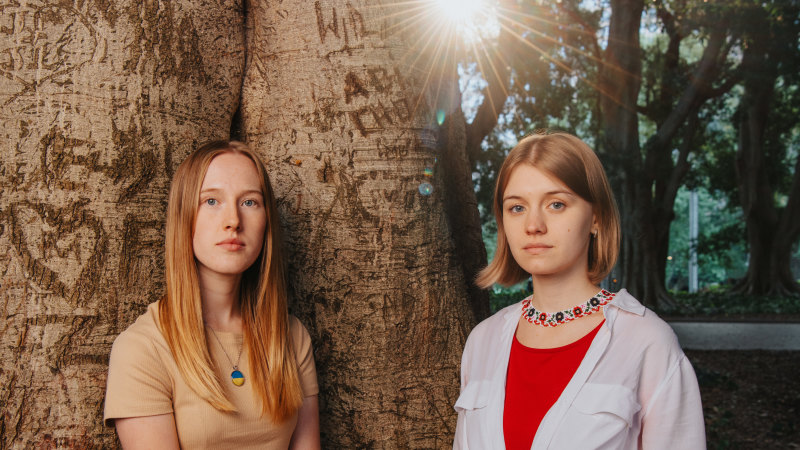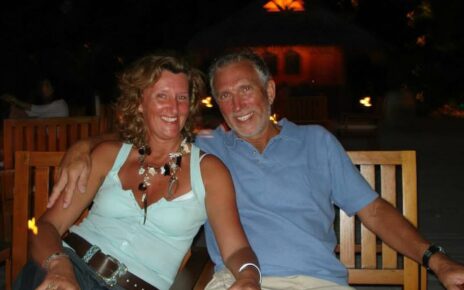Save articles for later
Add articles to your saved list and come back to them any time.
When the plane landed in Australia from Poland, it held just two young Ukrainian scientists – Maryna Dzuh and Svitlana Omelchuk.
Their host, CSIRO agricultural scientist John Kirkegaard, had hoped for more.
Ukrainian agricultural scientists Svitlana Omelchuk and Maryna Dzuh at Hyde Park in Sydney, this week.Credit: James Brickwood
But their male colleagues had been barred from leaving Ukraine, which was in a state of full mobilisation and couldn’t afford to lose any fighting-aged men.
Dzuh and Omelchuk are here as part of a global effort, supported by Australian scientists and international donors, to protect Ukrainian science as the war with Russia grinds on.
Kirkegaard, 60, spent months coordinating funding and flights, sending emails into a war zone and waiting – hoping – for a response.
Dzuh and Omelchuk are the first Ukrainian scientists to visit Australia under the initiative.
Canola fields near Creswick in Victoria.Credit: iStock
In Australia for about three weeks, they will spend most of their time in Sydney and Canberra working on canola production and research. Canola is used in the food, livestock feed and fuel industries and Australia and Ukraine are significant global producers of the crop.
Since the Russian invasion in early 2022, many Ukrainian scientists have been killed in artillery barrages or by mines or have been shot.
“You read the news about all the injured and the killed, and you feel so devastated. You understand you’re just lucky because this time you survived,” Dzuh said.
“The most terrible thing is we get used to it, all this horrible death.”
The Russian invasion has also smashed Ukraine’s scientific infrastructure. More than 3000 schools and universities have been damaged or shelled in the war. Some research institutes have been destroyed entirely.
Kharkiv, Ukraine’s scientific centre, sits close to the Russian border. Its urban fabric is now marked with craters, bulletholes and trench lines. The city’s radio-telescope was looted and mined, the seed bank bombed.
In August last year, Russian troops fired missiles at Kharkiv National University, a campus with no known military value. It destroyed the university’s rare book library – containing many volumes printed in the 1500s – and the photonics laboratory. Researchers picked microscopes out of the rubble.
“These are targeted at civilian populations,” said Vasyl Myroshnychenko, Ukraine’s ambassador to Australia. “These are war crimes.”
Other universities captured by Russian forces have been effectively de-Ukrainized, the curriculums ripped up, the speaking of Ukrainian banned.
Dzuh, 25, is a molecular biologist at the Ukrainian Scientific Institute of Plant Breeding in Kyiv. Omelchuk also works there as a plant breeder.
Dzuh’s lab sits low among the city’s taller buildings, giving some cover against the rockets.
“They are caught up in something they have no control over. And it threatens to overrun them,” Kirkegaard said
Russia spent months targeting electricity plants, hoping darkness and a freezing cold winter would sap Ukrainians’ will to fight.
Dzuh spent days without heating, electricity, internet or running water.
Her experiments – she works on genetically manipulating crops to increase hardiness and yield – rely on storing small samples in fridges and freezers. When they stopped running, all she could do was take her samples and shove them out a window into a snowbank.
“It’s hard to organise your experiments and projects because you’re just trying to survive,” she said.
There are no direct flights from Kiev to Australia: “Only missiles fly in the air, not planes,” she said.
After their flights and visas were arranged by the Australian Academy of Science, the pair slowly picked their way through mined roads from Kiev to Warsaw in Poland – an 800 kilometre journey that took three days.
Science is global, and progress is made together. Researchers frequently criss-cross the globe to meet their colleagues working on the same problem.
When war broke out, the global community went to work, building networks of jobs and scholarships abroad available for Ukrainian researchers and then fundraising to get them out of the war zone. Universities opened the doors, and philanthropists like the US-based Breakthrough Foundation got involved.
The foundation contributed $800,000 to the Australian Academy of Science to fund the visit and support research work, including lab and supercomputer time.
“Science is a universal language,” said Professor Frances Separovic, the academy’s foreign secretary. “We have to rebuild … Ukraine. We have to rebuild science. This is one way of keeping it going.”
Get a note directly from our foreign correspondents on what’s making headlines around the world. Sign up for our weekly What in the World newsletter.
Most Viewed in National
From our partners
Source: Read Full Article



